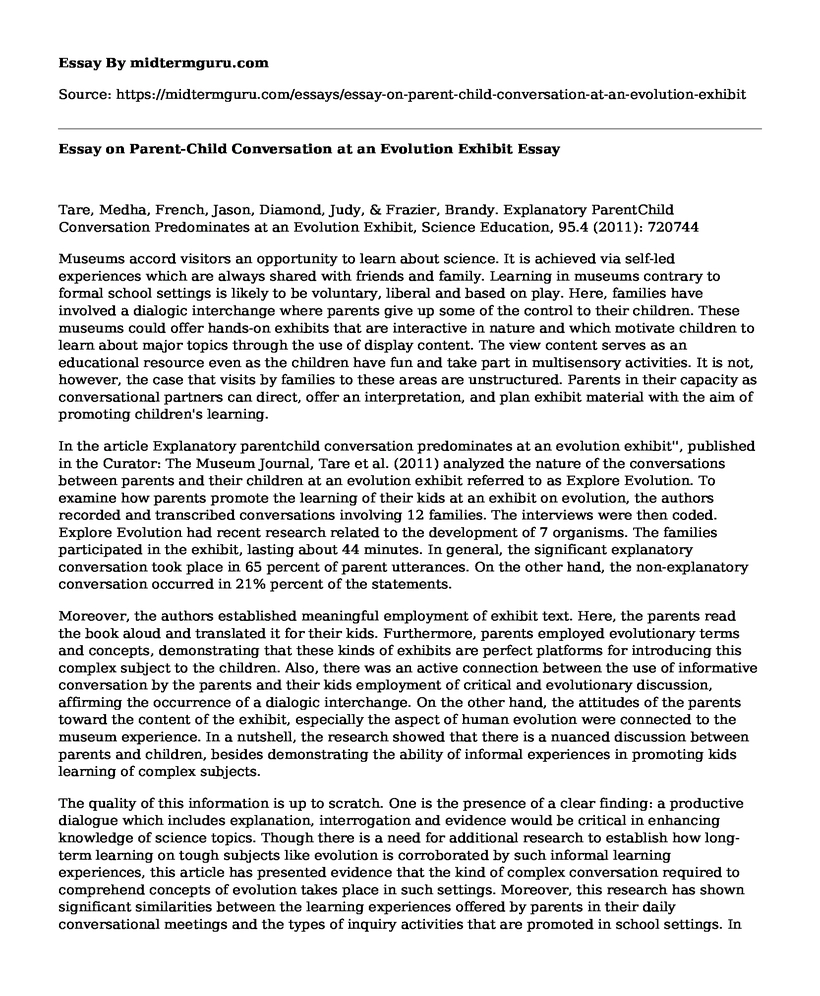Tare, Medha, French, Jason, Diamond, Judy, & Frazier, Brandy. Explanatory ParentChild Conversation Predominates at an Evolution Exhibit, Science Education, 95.4 (2011): 720744
Museums accord visitors an opportunity to learn about science. It is achieved via self-led experiences which are always shared with friends and family. Learning in museums contrary to formal school settings is likely to be voluntary, liberal and based on play. Here, families have involved a dialogic interchange where parents give up some of the control to their children. These museums could offer hands-on exhibits that are interactive in nature and which motivate children to learn about major topics through the use of display content. The view content serves as an educational resource even as the children have fun and take part in multisensory activities. It is not, however, the case that visits by families to these areas are unstructured. Parents in their capacity as conversational partners can direct, offer an interpretation, and plan exhibit material with the aim of promoting children's learning.
In the article Explanatory parentchild conversation predominates at an evolution exhibit'', published in the Curator: The Museum Journal, Tare et al. (2011) analyzed the nature of the conversations between parents and their children at an evolution exhibit referred to as Explore Evolution. To examine how parents promote the learning of their kids at an exhibit on evolution, the authors recorded and transcribed conversations involving 12 families. The interviews were then coded. Explore Evolution had recent research related to the development of 7 organisms. The families participated in the exhibit, lasting about 44 minutes. In general, the significant explanatory conversation took place in 65 percent of parent utterances. On the other hand, the non-explanatory conversation occurred in 21% percent of the statements.
Moreover, the authors established meaningful employment of exhibit text. Here, the parents read the book aloud and translated it for their kids. Furthermore, parents employed evolutionary terms and concepts, demonstrating that these kinds of exhibits are perfect platforms for introducing this complex subject to the children. Also, there was an active connection between the use of informative conversation by the parents and their kids employment of critical and evolutionary discussion, affirming the occurrence of a dialogic interchange. On the other hand, the attitudes of the parents toward the content of the exhibit, especially the aspect of human evolution were connected to the museum experience. In a nutshell, the research showed that there is a nuanced discussion between parents and children, besides demonstrating the ability of informal experiences in promoting kids learning of complex subjects.
The quality of this information is up to scratch. One is the presence of a clear finding: a productive dialogue which includes explanation, interrogation and evidence would be critical in enhancing knowledge of science topics. Though there is a need for additional research to establish how long-term learning on tough subjects like evolution is corroborated by such informal learning experiences, this article has presented evidence that the kind of complex conversation required to comprehend concepts of evolution takes place in such settings. Moreover, this research has shown significant similarities between the learning experiences offered by parents in their daily conversational meetings and the types of inquiry activities that are promoted in school settings. In the two circumstances, the authors reiterate the important role played by explanation.
Cite this page
Essay on Parent-Child Conversation at an Evolution Exhibit. (2021, Jun 03). Retrieved from https://midtermguru.com/essays/essay-on-parent-child-conversation-at-an-evolution-exhibit
If you are the original author of this essay and no longer wish to have it published on the midtermguru.com website, please click below to request its removal:
- An Extensive Description of Pregnancy and Child Development on Perla Example
- History Essay Example: Roman Civilization
- Essay Sample on School Transfer
- Essay Sample on John Muir: A Lifelong Romance With Nature
- Protests, Crisis, and Countercultures Worksheet
- Paper Example on Protest Movements
- Business English - Essay Sample







